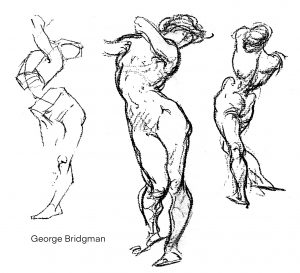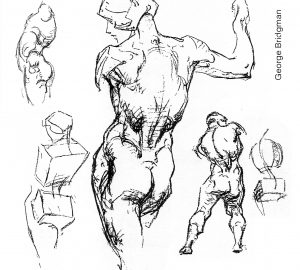 George Bridgman created some of the most powerful, authoritative, Michelangeloish figures of any drawing teacher I know since Michelangelo. Many drawing teachers are not the best practitioners. George was. Remarkably so.
George Bridgman created some of the most powerful, authoritative, Michelangeloish figures of any drawing teacher I know since Michelangelo. Many drawing teachers are not the best practitioners. George was. Remarkably so.
The drawings are anything but slick. They’re rugged. But they showcase mastery of anatomy and structure — what a body is made of and how it occupies space.
But he is not easy. Students get confused. Here are two reasons why:
He knows so much and says so little. He leaves out a lot in those drawings. That confuses students who want to know the details. The student is rightly confused. How can we know the missing parts until we know? But that “leaving out” of detail has an advantage. Students who pursue detail at the expense of structure never master drawing. Bridgman doesn’t wallow in details. He forges large structures to which details conform.
Bridgman teaches anatomy in his books, but they are some of the most difficult I know for beginners. If you’re going to study Bridgman, here’s my advice: Learn anatomy before you study Bridgman. If you start with George, you may get lost.
You know my recommendations.
You also know my highest recommendation – Proko
I know of no courses that compare. I’ve said this for years. I mean it.
So where does Bridgman come in?
Once you know enough anatomy to identify bones and muscle groups, Bridgman shows you how to rockify a human body. He “gives you permission” to invent figures. Anatomy now has a purpose. He inspires you to take liberties, to exaggerate anatomy, to create bodies as lyrical, powerful, chiseled, and effortlessly drawn as he did.
 And if you grow in your artistic sensibilities, I think you will grow to love how he understates. The more I understand the human body as physical forces in a machine, the more I marvel at the power he gets into figures with so few lines.
And if you grow in your artistic sensibilities, I think you will grow to love how he understates. The more I understand the human body as physical forces in a machine, the more I marvel at the power he gets into figures with so few lines.
But economy of lines is not the highest achievement of drawing. Neither is authoritative anatomy or convincing form, important as they are. They are technical skills. They are a way to draw. Bridgman uses them to invent imaginary figures, anatomically sound, mechanically credible, thick, strong, and graceful.
And he was a teacher. As difficult as his books are for beginners, they yield to study. I just don’t recommend the text like I do the drawings. I think the lessons are explained better, or simpler, or more accessibly elsewhere, as with Stephen Peck’s demo pages, or any of RB Hale’s lectures.
I’m going to give it a try, not to show off my drawing skill because compared to Bridgman… well — let’s leave that unstated. I am going to teach from Bridgman, standing in the shadow of his skill, narrating, partly because I know his drawings, mainly because I love his drawings, but also because one of my favorite jobs as a teacher is to explain his drawings to students.
I hope to help you appreciate, enjoy, and learn from the great George Bridgman.
About The Complete Guide.